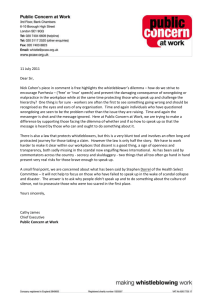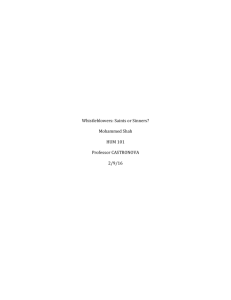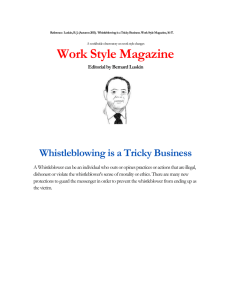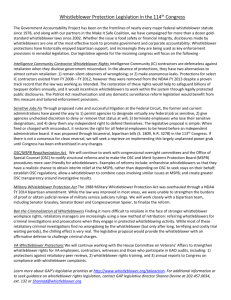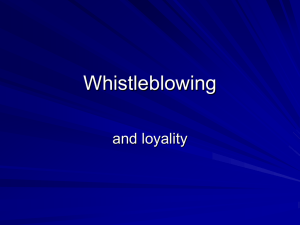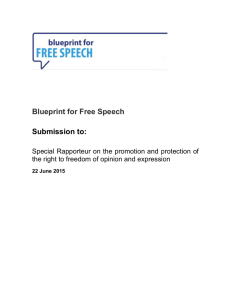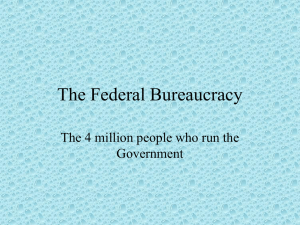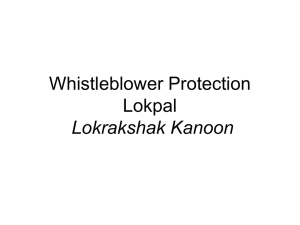Policy Analysis as to the Congressional to Provide Awards to All
advertisement
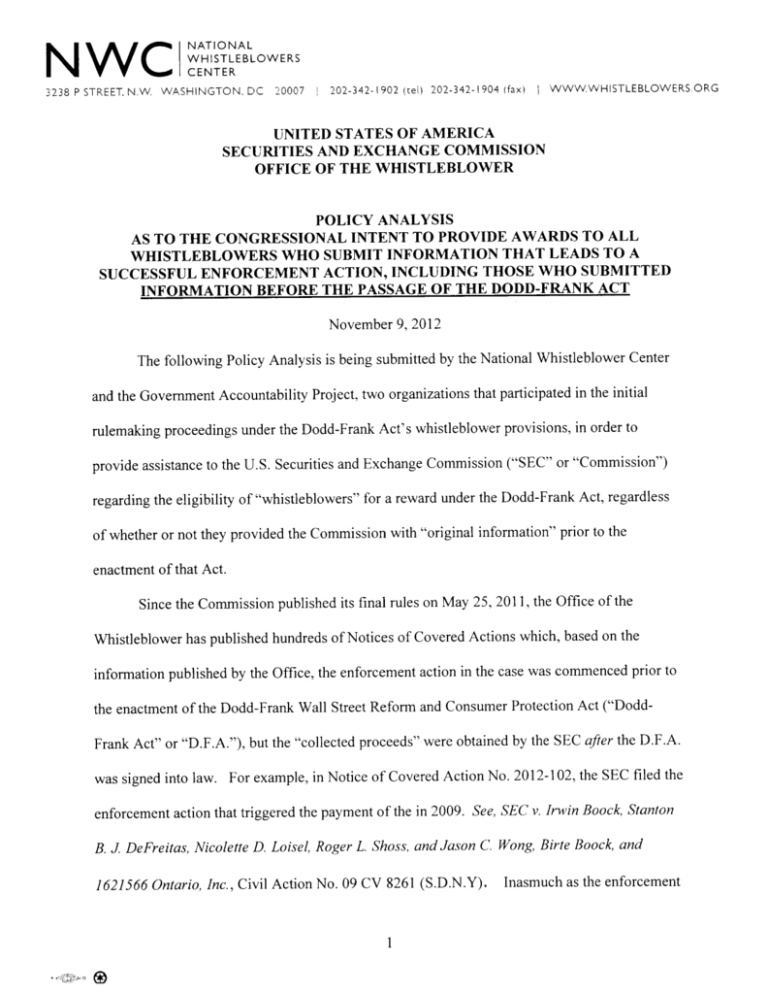
CENTER N we I ~~~~~~:BLLOWERS 3238 P STREET. N.W. WASHINGTON. DC 20007 I 202-342- i 902 (tel) 202-342-1904 (fax) I WWW.WHISTLEBLOWERSORG UNITED STATES OF AMERICA SECURITIES AND EXCHANGE COMMISSION OFFICE OF THE WHISTLEBLOWER POLICY ANALYSIS AS TO THE CONGRESSIONAL INTENT TO PROVIDE AWARDS TO ALL WHISTLEBLOWERS WHO SUBMIT INFORMATION THAT LEADS TO A SUCCESSFUL ENFORCEMENT ACTION, INCLUDING THOSE WHO SUBMITTED INFORMATION BEFORE THE PASSAGE OF THE DODD-FRANK ACT November 9, 2012 The following Policy Analysis is being submitted by the National Whistleblower Center and the Governent Accountability Project, two organizations that participated in the initial rulemaking proceedings under the Dodd-Frank Act's whistleblower provisions, in order to provide assistance to the U.S. Securities and Exchange Commission ("SEC" or "Commission") regarding the eligibility of "whistleblowers" for a reward under the Dodd-Frank Act, regardless of whether or not they provided the Commission with "original information" prior to the enactment of that Act. Since the Commission published its final rules on May 25, 2011, the Office of Whistleblower has published hundreds of the Notices of Covered Actions which, based on the information published by the Office, the enforcement action in the case was commenced prior to the enactment of the Dodd-Frank Wall Street Reform and Consumer Protection Act ("Dodd- Frank Act" or "D.FA."), but the "collected proceeds" were obtained by the SEC after the D.F.A. was signed into law. For example, in Notice of Covered Action No. 2012-102, the SEC filed the enforcement action that triggered the payment of the in 2009. See, SEC v. In1!in Boock, Stanton B. J DeFreitas, Nicolette D. Loisel, Roger L. Shoss, and Jason C Wong, Birte Boock, and 1621566 Ontario, Inc., Civil Action No. 09 CV 8261 (S.D.N.Y). Inasmuch as the enforcement ~ d§:fl~cJ' 15 (i action was filed in court in 2009, it can be reasonably assumed that if a whistleblower had provided original information that caused the SEC to conduct the investigation of Boock et aI., that information would have been provided to the SEC long before the D.F.A. was signed into law. Thus, the issue of whether or not a whistleblower who provided "original information" to the Commission prior to the enactment of the D.F.A. is disqualified from obtaining a reward will impact hundreds of potential whistleblowers, and will have a major impact on the early development and reputation of the SEC's whistleblower program. This Policy Analysis is submitted to help guide the Commission in its whistleblower determinations in cases in which the D.F.A., but the original information was provided to the Commission prior t the enactment of Commission obtained "collected proceeds" after the D.F.A. was signed into law. INTRODUCTION In 2010, Congress enacted the Whistleblower Incentive and Protection program as part of the Dodd-Frank Wall Street Reform and Consumer Protection Act ("Dodd-Frank Act" or "D.FA."). The explicit purpose of this program is to "motivate those with inside knowledge to come forward and assist the Governent to identify and prosecute persons who have violated securities laws and recover money for victims of financial fraud." S. Rep. 111-176, 110. Moreover, "( w Jhenever a whistleblower or whistleblowers tip leads the SEC to collect sanctions and penalties that are determined to be distributed to the victims of the fraud, the intent of the Committee is to reward the whistleblower prior or at the same time as paying such victims, recognizing that were it not for the whistleblower's actions, there would have been no discovery of the harm to the investors and no collection of any sanctions for their benefit." Id. at 111-12. 2 the Dodd-Frank Act is Consistent with the intent of congress, the plain text of unambiguously clear that any whistleblower who provides original information to the Securities and Exchange Commission ("SEC") that results in sanctions of more than $1,000,000 shall receive an award, unless he falls into one of several explicitly enumerated categories. D.F.A. § 922(c)(2).J Unfortunately, the SEC has directly contradicted the clear intent of Congress and the plain text of the Act by creating a rule that impermissibly expands the statutory definition of "original information" to exclude infonnation that was not "(pJrovided to the Commission for the first time after July 21, 2010," when the Act was passed. 17 C.F.R. § 240.21F-4(b)(1)(iv). By doing so, the SEC has impermissibly narrowed the scope of the whistleblower program and denied awards to hundreds of whistleblowers who would otherwise have received them. The plain text, structure, and legislative of the Act are all unambiguously clear that any whistleblower who submits original information that leads to sanctions of at least $1,000,000 is eligible to receive an award, unless he falls into one of several explicitly enumerated categories. The date that a whistleblower submits information is not part of the statutory definition of original information, and it has no bearing whatsoever on whether he is eligible to receive an the Act award. Nor did the SEC have authority to make any such regulation, as the plain text of gives permits it to make only procedural regulations regarding the submission of information or the denial of awards. The only valid timing limitation with respect to the submission of information or eligibility for an award is the procedural requirement that a claim for an award must be submitted within 90 days of the SEC posting notice ofa covered action. 17 C.F.R. §240.21F-10(a). Under the framework articulated by the Supreme Court in Chevron v. National Resources Congress' clear intent and its Defense Council, 467 U.S. 837 (1984), the SEC's contradiction of i Codified at 15 U.S.c. § 78u-6(c)(2). 3 lack of authority to create substantive regulations as to the submission of information would require a reviewing court to strike down its rule denying original information status to whistleblowers who submitted information before July 21, 2010. Rather than force unnecessary litigation on this issue, the SEC should immediately retract its rule and bring its regulations back into harmony with the plain text of the Act. ARGUMENT Under the familiar two-step framework of Chevron v. National Resources Defense Council, 467 U.S. 837 (1984), a reviewing Court first examines whether Congress has "directly addressed the precise question at issue." Id. at 842-843. If so, an agency's rule or regulation is invalid and owed no deference where it is inconsistent with the "unambiguously expressed intent of Congress." Id., at 843. To determine Congressional intent, courts first look to the plain language of the statute and employ "traditional tools of statutory construction." Id., at 843 n.3; INS v. Cardoza-Fonseca, 480 U.S. 421, 448 (1987); Natural Resources Defense Council v. E.P.A., 489 F.3d 1250 (D.C. Cir. 2007). In this case, the question at issue is whether Congress intended to define "original information" to exclude information submitted before this July 21, 2010, thereby denying awards to whistleblowers who made submissions before this date. Congress directly indicated that this was not its intent in at least three ways. First, its explicit definition of original information did not include any limitation as to the date of submission. D.F.A. § 922(a)(6). Second, it stated that the SEC "shall pay an award or awards to 1 or more whistleblowers who voluntarily provided original information to the Commission that led to the successful enforcement" with no limitation as to the date of submission. D.F.A. § 922(b)(emphasis added). Third, Congress explicitly enumerated the circumstances under which the SEC could deny an award to a 4 whistleblower who submitted original information, again without any reference to the date of submission. D.F.A. § 922(c)(2). Several tools of statutory construction are relevant to demonstrate Congress' intent on this question, the most important of which is the basic principle that Congress is presumed to act intentionally and purposefully when it crafts statutory language, and thus the inclusion or exclusion of certain language is also purposeful and intended. BFP v. Resolution Trust Corp., factors as its 511 U.S. 531,537 (1994). Because Congress enumerated an explicit list of definition of "original information," and enumerated an explicit list of exclusions from eligibility to receive an award, it must therefore be presumed that Congress intended these lists to be exhaustive. The SEC's rule excluding submissions made before July 21, 2010 contradicted this clear statement of Congressional intent in two ways: it impermissibly adds a factor to the definition of "original information" and impermissibly excludes an additional category of individuals from eligibility to receive an award, making the rule doubly invalid. I, CONGRESS CLEARLY AND UNAMBIGUOUSLY INTENDED TO GIVE AWARDS TO WHISTLEBLOWERS WHO SUBMITTED ORIGINAL INFORMATION BEFORE JULY 21, 2010 A. The Plain Language of the Dodd-Frank Act Mandates Awards to Whistleblowers Who Submitted Original Information Before July 21, 2010 The plain language of the Dodd-Frank Act is clear and unambiguous as to who can and the Dodd-Frank Act defines a cannot receive a whistleblower award. Section 922 of "whistleblower" as "any individual who provides, or 2 or more individuals acting jointly who provide, information relating to a violation of the securities laws to the Commission, in a manner established, by rule or regulation, by the Commission." D.F.A. § 922(a)(6). The Act defines "original information" as infonnation that: 5 (A) is derived from the independent knowledge or analysis of a whistleblower; (B) is not known to the Commission from any other source, unless the whistleblower is the original source of the information; and (C) is not exclusively derived from an allegation made in a judicial or administrative hearing, in a governmental report, hearing, audit, or investigation, or from the news media, unless the whistleblower is a source of the information. the Act then goes on to provide that: D.F.A. § 922(a)(3). Section 922 of In any covered judicial or administrative action, or related action, the Commission, under regulations prescribed by the Commission and subject to subsection (c), shall pay an award or awards to 1 or more whistleblowers who voluntarily provided original information to the Commission that led to the successful enforcement of the covered judicial or administrative action, or related action.. .. D.F.A. § 922(b)(emphasis added). Finally, the Act explicitly enumerates the categories of individuals who, even if they provide original information, are not eligible to receive an award: No award under subsection (b) shall be made-(A) to any whistleblower who is, or was at the time the whistleblower acquired the original information submitted to the commission, a member, officer, or employee of-(i) an appropriate regulatory agency; (ii) the Department of Justice; (iii) a self-regulatory organization; (iv) the Public Company Accounting Oversight Board; or (v) a law enforcement organization; (B) to any whistleblower who is convicted of a criminal violation related to the judicial or administrative action for which the whistleblower otherwise could receive an award under this section; (C) to any whistleblower who gains the information through the performance of an audit of financial statements required under the securities laws and for whom such submission would be contrary to the requirements of section lOA of the Securities Exchange Act of 1934 (15 U.sc. 78j-1); or (D) to any whistleblower who fails to submit information to the Commission in such form as the Commission may, by rule, require. D.F.A. § 922(c)(2). Thus, on the face of the statute, the SEC shall give an award to any individual who provides "information relating to a violation of the securities laws" that results in sanctions of more than $1,000,000, unless that individual falls into one of the specific categories defined in Section 922( c). 6 B. The Rules of Statutory Construction Demonstrate that the SEC's Regulation Expanding the Definition of Original Information is Contrary to the Clear Intent of Congress While the plain language of Section 922 clearly demonstrates that Congress intended to award all whistleblowers who provide original information that leads to at least $1,000,000 in sanctions, the rules of statutory construction make it clear that no other interpretation of the statute is possible. As stated above, central to any statutory analysis is the presumption that Congress acts purposefully and intentionally when it crafts statutory language, and thus the inclusion or exclusion of certain language is also purposeful and intended. BFP, 511 U.S. at 537. The primary rule of statutory interpretation applicable to these circumstances is expressio unius exc!usio alterius, meaning that "(tJo express or include one thing implies the exclusion of the other, or of the alternative." In other words, where Congress defines a thing by listing conditions, or states a general rule with a list of exceptions, those lists are presumptively exclusive. See, e.g., Andrus v. Glover Canst. Co., 446 U.S. 608,616-17 (1980) (holding that "( w Jhere Congress explicitly enumerates certain exceptions to a general prohibition, additional exceptions are not to be implied, in the absence of evidence of a contrary legislative intent. "); Nashvile Milk Co. v. Carnation Co., 355 U.S. 373,376 (1958) (holding that Congress' decision to define a general term with a list meant the list was exclusive); Cant'! Cas. Co. v. United States, 314 U.S. 527, 533 (1942)(holding "(tJhe statement of the conditions negatives action without the satisfaction of those requirements. Generally speaking a 'legislative affirmative description' implies denial of the nondescribed powers. "). In this case, Congress defined original information with an explicit list of factors and provided an explicit list of exceptions to the general rule that the SEC "shall pay an award or 7 awards to 1 or more whistleblowers who voluntarily provided original information to the Commission that led to the successful enforcement." D.F.A. § 922(b)(emphasis added). By omitting the date of submission of original information (or any other date) from these explicit lists, Congress clearly demonstrated its intent to make the date that a whistleblower submits original information irrelevant to his eligibility to receive an award. The rule of expressio unius exc!usio alterius also applies in situations where Congress "includes particular language in one section of a statute but omits it in another," which creates the presumption that the omission was "intentional(J and purpose(fulJ." BFP v. Resolution Trust Corp., 511 U.S. 531, 537 (1994). In this case, in addition to the award provisions, Section 922 also contains a prohibition on retaliating against whistleblowers. Congress expressly created a statute of limitations for whistleblower retaliation cases, stating that such cases: may not be brought more than 6 years after the date on which the violation . . . occurred; or more than 3 years after the date when facts material to the right of action are known or reasonably should have been known by the employee alleging a violation. . . . (andJ may not in any circumstance be brought more than 10 years after the date on which the violation occurs. D.F.A. § 922(h)(1 )(B)(iii). Had Congress wished to create a similar limitation on submissions of original information, it could have done so. The fact that, in the same section, Congress created a time-based limitation for retaliation cases, but did not create such a limitation in the definition of original information or the eligibility for an award, further supports the presumption that Congress did not intend to create any time-based bars to eligibility. Nor is there any evidence that Congress intended a different result. The only provision in the Dodd-Frank Act that so much as mentions the date of submission of original information is Section 924(b), which provides that: Information provided to the Commission in writing by a whistleblower shall not lose the status of original information (as defined in section 78u-6( a )(3) of this 8 title) solely because the whistleblower provided the information prior to the effective date of the regulations, if the information is provided by the whistleblower after July 21, 201 O. D.F.A. § 924(b). The plain text of this provision simply states that original information the SEC's regulations, is still original submitted after July 21, 2010, but before the enactment of information. The purpose for this provision is clear: it encourages whistleblowers who have original information to report it as soon as possible by declaring that the SEC could not create any regulation that would change what constituted original information. Section 922(c)(2)(D) gives the SEC authority to create procedural regulations regarding the "form" of submitted information and permits it to deny awards if information is not submitted in that form. Absent Section 924(b), the SEC could have denied an award to any whistleblower who submitted original information before the enactment of its regulations, simply because the whistleblower failed to follow procedures that did not yet exist. Without Section 924(b), whistleblowers who had information about ongoing securities violations would thus justifiably feel the need to delay their submission until after the enactment of the regulations, thereby delaying enforcement actions and increasing the injury to shareholders. By explicitly stating that information submitted after the passage of the Act, but before the enactment of the SEC's regulations, qualifies as original information, Congress ensured that whistleblowers who had original information would submit it as soon as possible. Moreover, while the primary purpose of Section 924(b) is to address the treatment of submissions made after July 21, 2010, it also reaffirms that the definition of original information is not subject to the SEC's regulation. As explained above, the SEC's authority to regulate the submission of information is set out in Section 922( c )(2)(D), which limits that authority to making procedural rules as to the "form" of submissions. Section 924(b) reinforces this 9 instruction by making it clear that the SEC's regulations must treat information submitted before their enactment the same as information submitted after, i.e., the regulations may not change what constitutes original information. Nor does the fact that Section 924(b) is silent as to the treatment of information submitted before July 21, 2010 imply that Congress intended to exclude such submissions from the definition of original information. Any ambiguity of Section 924(b) as to the treatment of such submissions is fully resolved by Congress' explicit definition of original information and explicit criteria for denying eligibility in Sections 922(a)(6) and (c)(2). As the SEC's authority to interpret these sections is limited to crafting procedures as to the "forn1" of submitted information, it has no authority to alter the statutory definition of what constitutes original information and may not use any ambiguity in Section 924(b) to override the clear statement of Congressional intent in Sections 922(a)(6) and (c)(2). Finally, the legislative history and plain text of the Act are quite clear that Congress intended the SEC to give awards to all whistleblowers: whenever a whistleblower or whistleblowers tip leads the SEC to collect sanctions and penalties. . . the intent of the Committee is to reward the whistleblower prior or at the same time as paying such victims, recognizing that were it not for the whistleblower's actions, there would have been no discovery of the harm to the investors and no collection of any sanctions for their benefit. S. Rep. 111-176, 111-12 (emphasis added), and: In any covered judicial or administrative action, or related action, the Commission, under regulations prescribed by the Commission and subject to subsection (c), shall pay an award or awards to 1 or more whistleblowers who voluntarily provided original information to the Commission that led to the successful enforcement of the covered judicial or administrative action, or related action.. .. 10 D.F.A. § 922(b)(emphasis added). By emphasizing that any regulations enacted by the SEC are subject to Section 922( c), Congress again emphasizes the exclusivity of its list of factors for denying awards to whistleblowers. In sum, the plain text and legislative history of the Act clearly intend to reward all whistleblowers and neither the exclusive definition of original information, nor the exclusive factors for denying an award, contain any mention of a bar on information submitted before the passage of the Act. The only provision that so much as mentions the passage of the Act with respect to original information is actually an instruction to the SEC that it has no authority to alter its definition. As such, the SEC's regulation changing the definition of original information to exclude submissions made before July 21, 2010 is both contrary to the clear intent of Congress and beyond its authority. C. The Structure of Sections 922 and 924 of the Dodd-Frank Act Demonstrate that Congress Intentionally and Purposefully Crafted the Act to Include Awards to Whistleblowers Who Submitted Original Information Before July 21,2010 In addition to the plain language of the Dodd-Frank Act, Congress' decision to include an "original source" exception in the definition of original information and to make the award provisions of the Act retroactive, demonstrate that it was aware of the history of whistleblower reward statutes and crafted the Act to ensure that all whistleblowers would receive an award. The Dodd-Frank Act is not the first statute to create an award for whistleblowers who provide the government with original information that results in the recovery of public funds. The False Claims Act, 31 U.S.C. § 3729 et seq., has long permitted whistleblowers with original information to file qui tam lawsuits on behalf of themselves and governent, and has awarded 11 those whistleblowers with a percentage of any successful recovery? For much its history, the False Claims Act barred plaintiffs from filing suit based on information already in the governent's possession, even if that information had been provided by the qui tam plaintiff himself. See 31 U.S.c. § 3730(b)(4) (1982 ed.). Recognizing the perverse situations created by this rule, Congress amended the False Claims Act in 1986 to create an "original source" exception, permitting qui tam suits based on public or government information so long as the plaintiff had direct and independent knowledge of the information and had provided the information to the government before filing suit. In 1989, three years after the creation of the "original source" exception, a plaintiff brought a qui tam suit against Hughes Aircraft Company, alleging that it had presented false claims between 1982 and 1984. Hughes Aircraft Co. v. u.s. ex reI. Schumer, 520 U.S. 939,945 (1997). Hughes filed a motion to dismiss on grounds that, prior to the plaintiff s suit, the governent had conducted an audit of Hughes that revealed at least some of the violations alleged in the complaint. Id. at 942-43. The Supreme Court rejected the plaintiffs argument that he was an original source of his allegations, finding that Congress had not explicitly made the 1986 amendments retroactive, and concluding that the Court was therefore required to apply the law as it existed at the time the alleged misconduct occurred. !d. at 946. Thus, because the alleged misconduct occurred between 1982 and 1984, and because the law at that time did not have an "original source" exception, the lower court should have granted Hughes' motion to dismiss. Id. at 951-52. 2 Short for "qui tam pro domino rege quam pro se ipso in hac parte sequitur," which means "who pursues this action on our Lord the King's behalf as well as his own." Vermont Agency of Natural Res. v. Us. ex reI. Stevens, 529 U.S. 765, 769 n. 1 (2000). 12 Like the post-1986 False Claims Act, the Dodd-Frank Act award provisions include an "original source" exception. D.F.A. § 922(a)(6). The Dodd-Frank Act, however, then goes one step farher and makes those provisions apply retroactively to conduct that occurred before the Act's passage: A whistleblower may receive an award pursuant to section 78u-6 of this title, regardless of whether any violation of a provision of the securities laws, or a rule or regulation thereunder, underlying the judicial or administrative action upon which the award is based, occurred prior to July 21, 2010. D.F.A. § 924(c). As explained above, absent evidence to the contrary, the rules of statutory construction require the presumption that Congress acts intentionally and purposefully when it drafts legislation. BFP, 511 U.S. at 537. The fact that Congress, in a law that closely resembles the False Claims Act, explicitly addressed the two issues that barred the Hughes plaintiffs suit, requires the presumption that Congress crafted Sections 922 and 924 to ensure that, unlike Hughes, whistleblowers who provided information to the SEC before the passage of the Act would still receive an award. The SEC's rule to exclude information submitted before July 21, 2010 directly contradicts this clear intent. By barring awards to whistleblowers who submitted information before the enactment of the Dodd-Frank Act, the SEC has resurrected a bar that Congress abolished more than twenty five years ago. Had Congress intended the Dodd-Frank Act to bar claims by whistleblowers who submitted original information before its passage, it could easily have done so by using language similar to the pre-1986 False Claims Act. Congress, however, did not do this. Instead, it used the language of the amendment it made to fix that issue, and then made the provision retroactive, clearly demonstrating its intent to give awards to all whistleblowers who submit original information. 13 D. The Only Timing Requirement Related to a Whistieblower's Eligibilty for an Award is the Procedural Rule that the Whistleblowers Submit a Claim for the Award Within 90 Days of the Date that the SEC Provides the Notice of a Covered Action While it is clear that Congress did not intend to bar awards to whistle blowers who submitted original information before July 21, 2010, there is at least one time-sensitive requirement with respect to the receipt of an award. Pursuant to its authority to promulgate procedural regulations as to the submission of information and denial of awards, the SEC properly crafted a rule stating that it will post notice each time an action results in sanctions of at least $1,000,000, and instructing whistleblowers wishing to claim an award to submit such claims within 90 days. 17 C.F.R. §240.21F-1O(a). This rule is consistent with Congress' clear intent to "reward the whistleblower prior or at the same time as paying such victims, recognizing that were it not for the whistleblower's actions, there would have been no discovery of the harm to the investors and no collection of any sanctions for their benefit." S. Rep. 111-176 at 111-12. Moreover, by making it clear that a whistleblower's eligibility for receiving an award does not begin until after the SEC has completed an enforcement action and recovered sanctions, the SEC has again reaffirmed Congress' intent to give awards "whenever a whistleblower or whistleblowers tip leads the SEC to collect sanctions and penalties. . .." S. Rep. 111-176, 111- 12 (emphasis added). Unlike the False Claims Act, where the originality ofa whistleblower's information is a jurisdictional requirement to filing suit, the originality of an SEC whistleblower's information does not become relevant until after the SEC has completed its enforcement action. The question of when the whistleblower submitted his information is irrelevant to this analysis. So long as the whistleblower "voluntarily provided original information to the Commission that led to the successful enforcement of the covered judicial or 14 administrative action," the plain text of the Act states that the SEC "shall pay an award." D.F.A. § 922(b)(emphasis added). E. The SEC's Rule Denying Awards to Whistleblowers who Submitted Original Information Before July 21, 2010 is Unjust and Wil Receive no Deference from a Reviewing Court When an agency promulgates regulations that contradict clear Congressional intent, a reviewing court must strike down the regulation. In cases like this, where Congressional intent is made clear through the explicit definitions and explicit lists of exclusions, federal courts have long used the doctrine of expressio unius exc!usio alterius to invalidate agency actions. Recently, the D.C. Circuit employed this precise rationale to invalidate Environmental Protection Agency regulations that created additional exceptions to a statute requiring the regulation of solid waste incinerators. National Resources Defense Council v. E.P.A., 489 F.3d 1259-60 (D.C. Cir. 2007) (citing Andrus, 446 U.S. at 616-17). A reviewing court may also invalidate an agency's regulation if it creates a patently unjust result for the regulated parties, so long as the underlying statute may be validly interpreted in a way that avoids that result. 1 A Sutherland Statutory Construction §45 .12 (7th ed. ) (citing Esta Later Charters, Inc. v. Ignacio, 875 F.2d 234, 239 (9th Cir. 1989) (finding that where the court is asked to select between equally plausible statutory interpretations, it is appropriate to consider the effects on the parties involved and choose the interpretation that avoids a patently unjust result.) The SEC's rule barring awards to whistleblowers who submitted original information before July 21, 2010 is patently unjust for several reasons. First and foremost, numerous provisions of the Act, particularly Section 924(b), make clear that Congress intended to encourage whistleblowers to report violations as quickly as possible. To then craft a rule that 15 denies awards to whistleblowers that who witnessed wrongdoing before the passage of DoddFrank and promptly reported it to the SEC, while rewarding whistleblowers who witnessed similar misconduct but delayed reporting it until after the passage of Dodd- Frank is absurd and unjust. By making the awards provisions retroactive, Congress signaled its intent to give awards to all whistleblowers, regardless of when they submitted their information. The Dodd-Frank Act also specifically provides that whistleblower awards are to be paid out of a fund created from the proceeds of enforcement actions, including those based on whistleblower information. D.F.A. § 922(g). The fund does not distinguish between actions based on information submitted before or after July 21, 2010. To deny awards to whistleblowers who submitted information before July 21, 2010 and then use the proceeds collected from actions based on their information to pay whistleblowers who delayed reporting until after the passage of Dodd-Frank is similarly absurd and unjust. CONCLUSION For the reasons set forth above, whistleblowers are fully eligible for a reward, even if the "original information" provided to the Commission was provided prior to the enactment of the D.F.A. However, the Commission must obtain the "collected proceeds" after the D.F.A. came into effect, and the whistleblower must adhere to the procedural rules for filing a claim set forth in the D.F.A. and the SEC regulations. SUb~ Stephen M. K Dean Zerbe Counsel for the National Whistleblower Center Of Counsel: Tom Devine, Governent Accountability Project 16 THE AMERICAN UNIVERSITY WASHINGTON COLLEGE OF LAW AND THE GOVERNMENT ACCOUNTABLITY PROJECT PANEL 2 THE SPECIAL CASE OF NATIONAL SECURITY WHISTLEBLOWERS "AVOIDING TRAPS, MAKING CHANGE AND AN EFECTIVE LEGISLATIVE RESPONSE" STEPHEN M. KOHN!! President, National Whistleblower Center www.whistleblowers.org June 23, 2008 National sccurity whistlcblowers lack adequate protections under law.2 As a group, they are excluded from the protections affordcd to other fcderal cmployecs undcr the Civil Service Reform Act/Whistlcblower Protection Act ("WPA"). Federal employecs, including those who work in national security related agencies, urgently need Congress to enact fair and reasonable whistleblower protections. Any such law should provide national security whistleblowers with the same lcvel of protection currently afforded all federal workcrs under Title VII of the Civil Rights Act of 1964, which includes compensatory damage awards, acccss to federal court and an opportunity to have a jury hear the case. See, Dan Browning, "Ex-Agent Wins Lawsuit Against FBI," Minneapolis Star Tribune (February 5, 2007), Kohn Presentation, pp. 12- i 3. CURRENT STATUS OF FBI/NATIONAL SECURITY WHISTLEBLOWER PROTECTIONS National security whistleblowers were explicitly excluded from coverage under the Civil Service Refonn Act/Whistleblowcr Protcction Act C'WPA"). Under these laws, the definition of a covered "exccutive agency" explicitly did not include the Federal Burcau of Investigation ("FBI"), Ccntral Intelligence Agency ("CIA"), the Defense Intelligence Agency, the National Security Agency, among other intelligence organizations. The President of the United States also has the authority to cxcludc other intelligencc related agencies (or units within agencies) from covcrage undcr the WPA, 5 U.S.c. section 2302(a)(2)(C). Despite the exclusions contained in the WPA, thc Department of Justice implemented regulations govcrning FBI employee whistleblowing. Thesc regulations as codified in 28 C.F.R. Part 27. Congress also enacted a very limited Intelligence Community whistlcblower law. The following table comparcs the whistleblower protections provided FBI agents (and other employees in the intelligence communities) with twenty other fedcral whistleblower laws. The results speak for themselves: Right to Have Case Heard by Judge or Right to Present Witnesses Before A Judl!e Compensatory or Special Damages Right to a Trial or Hearing Judicial Yes Yes Yes Yes Yes Superfund Act Yes Yes Yes Yes Yes 42 U.S.C S9610 Clean Air Act Yes Yes Yes Yes Yes Yes Yes Yes Yes Yes Yes Yes Yes Yes Yes Yes Yes Yes Yes Yes Yes Yes Yes Yes Yes Yes Yes Yes Yes Yes Yes Yes Yes Yes Yes Yes Yes Yes Yes Yes Yes Yes Yes Yes Yes Yes Yes Yes Yes Yes Yes Yes Yes Yes Yes Yes Yes Yes Yes Yes Yes Yes Yes Yes Yes Yes Yes Yes Yes Yes Yes Yes Yes Yes Yes Yes Yes Yes Yes Yes Yes Yes Yes Yes Yes No No No No No No No No No No Employee Whistleblower Protection Statutes Sarbanes-Oxley Act Review Jury 18 U.S.C SI514A 42 U.sC S7622 Pipeline Safety Act 49 U.sC S60129 Safe Drinking Water Act 42 U.sC S300J-9(1 Solid Waste Disposal Act 42 U.S.C &697 i Toxic Substances Act 15 U.S.C S2622 Water Pollution Control Act 33 U.sC S 1367 Energy Reorganization Act 42 U.sC S585 i Aviation Relonn Act 49 U.sC &4212\ Vehicle Safety Act 49 U.sC S3 1105 False Claims Act 3 I U.sC &3730 (h) Federal Reserve Bank Employee Protection Act 3 i U.sC &5328 Occupational Ilealth and Safety Act FDIC Employee Protection Act 12 U .S.C S 1 790 (b) First Amendment Violations 42 U.sC S 1983 Title VII Anti-Retaliation 42 U.sC &2000e-3(a) Federal Court Witnesses 42 U.S.C S1985 Americans with Disabilities Act 42 U.sC S 1 2203 FBI Whistleblower Protection 27 C.F.R. Part 28 Intelligence Community WPA,5 U.S.c. App. 3, sec. 811 2 LEG ISLA TIVE FIX National security whistleblowers nced legal protcction. Currcntly, both the Senate and the House have passed amendments to the Whistleblower Protection Act ("WP A") which seek to overhaul the WP A and correct numerous defects in the law and/or the decisions of the U.S. Court of Appeals for the Federal Circuit. See, H.R. 985 and S. 274. The two amendments are different, and the two Houses of Congress are in the proccss of reconciling thesc diffcrences. The current prospects for protccting national security whistlcblower protection within thc i i Olh Congress arc quickly fading. First, the Bush Administration targeted thc national sccurity related provisions in the proposed amendments to the Whistleblower Protection Act as grounds for vetoing the legislation.3 This veto threat has resulted in added Congressional opposition to the Whistleblower Protection Act Amendments, especially those related to national security whistleblowers. Second, S.274, the Senate's amendments to the WPA, although well intentioned, still contain national security exclusions. In other words, if the Senate bill passes, national security whistleblowers will remain without any adequate legal protection and will remain outside the protections of the WP A. Thus, the only way national security whistleblowers will be protected under the current WPA reform efforts is if the Senate agrees with the I louse version of the law, despite the veto thrcats coming from the White Housc. In Section 10 of H.R. 985 the House of Representatives took the lead in proposing cxplicit protections for national security whistleblowers. Section i 0 is a major advancement in current law, and would permit national security whistleblowers in the FBI, CIA, NSA and other agencies to "blow the whistle" and obtain legal protections. The inclusion of Section lOin any final House-Senate compromise should be strongly supported. However, even Section 10 contains significant shortcomings which undercut the intended reform. During the floor debate on H.R. 985, amendments to weaken the national security protections were proposed and passed. These amendments were political in nature and were not part of the original legislation. Two aspects of the lastminute amendments are of particular concern: (i) the scope of protected activity was radically narrowed, and (2) the right to a jury trial, which was explicitly granted to other federal employees, was delctcd out of Section 10. See, H.R. 985 Section i O(t) (3) 3 (narrow definition of protected Congressional disclosures); Section 10(f)(4) (narrow definition of "offcials" for whom whistleblower disclosures may be made); Section 10(c)(3) (dropping of the word "jury" which existed in the earlier versions). It was originally hoped that the problems caused by the last-minute amendments would be favorably resolved in the House-Senate negotiation process. If the current reform efforts do not succeed, the whistleblower community should reconsider its approach to seeking to amend the WPA. The WPA statute is riddled with numerous problems, and haunted by an endless series of bad judicial precedent from the U.S. Court of Appeals for the Federal Circuit. One of the problems with the WPAcorrection approach to reform the WP A is that there is simply too much to correct, and proposed amendments become long and complicated, increasing the risk that Members of Congress will not understand the law and that the Executive Branch will raise disingenuous objections to the law based, in part, on the cumbersome nature of the needed amendments. An alternative approach to reform is to abandon the WPA model altogether. Instead, federal whistleblower rights should be predicated on the Title VII modeL. The basis for this alternative approach is as follows: i. National security employees are already protected under Title VII's antidiscrimination laws. Currently, under Title VII of the Civil Rights Act of 1964, as amended, essentially all federal employees are already protected. Consistent with this coverage, the U.S. Supreme Court, in a 2008 decision, held that federal employees were also covered under the Age Discrimination in Employment Act's anti-retaliation provisions. Gomez-Perez v. Potter, Postmaster General, -- U.S. - (May 27, 2008). Thus, precedent already exists which permits federal employees who work in agencies such as the FBI and CIA to have access to federal courts in retaliation and discrimination cases. Administrative procedures and practices designed to ensure that confidential information is not improperly injected into a Title VII proceeding already exist, and employees at the FBI, CIA, NSA and other agencies regularly fie Title VII claims. There is no evidence on the public record which indicates that these agencies have not been able to fully protect against the release of classified information during Title VII discrimination proceedings. 4 2. Under Title VII employees who allege discrimination or retaliation are already entitled to due process rights envisioned under H.R. 985. These laws have provided federal employees the right to fair and adequate procedures for nearly 20 years. Employees can obtain the simple justice which is expected in our system, including a day in court, a trial by a jury of one's peers and a full "make whole" remedy, including attorney's fees and compensatory damages, if they prevaiL. Procedures which work are already in place and already cover national security related employees. Simply expanding the pre-existing structure to also include retaliation based on other forms of protected disclosures would be feasible and would negate many of the "red herring" arguments set forth by opponents of protecting national security whistleblowers under II.R. 985/5. 274 3. The actual adjudication of a whistleblower retaliation case and a civil rights retaliation case are substantially identicaL. The only difference is what constitutes protected activity. Under the Civil Rights laws, protected activity concerns civil rightsrelated disclosures. Under the WP A, protected activity generally means a violation of law or waste of taxpayer monies. However, under both Title VII and the WPA, there is no need to demonstrate the veracity or validity of the underlying protected disclosure. The investigation of substantive whistleblower allegations can (and would) remain within the domain of the Offce of Inspectors General or other oversight bodies. In other words, under both anti-retaliation laws, it is the act of disclosure that is protected _ regardless of whether the allegations pan out. In this manner the likelihood that a national security related whistleblower case results in the disclosure of any classified information is not only remote, but also almost inconceivable. Unquestionably, the disclosure of classified information in such proceedings would be prohibited and unnecessary . The real issue in a retaliation case - whether it is fied under Title VII or the WP A -- concerns employee performance. Was the alleged adverse action in retaliation for a protected disclosure or what is justified under the circumstances. This is the heart of all employment-retaliation cases, and the evidentiary analysis of this aspect of a case is identical, regardless of whether the case is filed under the WPA or Title VII. Under Title VII, FBI agents and CIA case offcers can have allegations of their alleged performance failures and misconduct fully adjudicated in Court. Issues of motive, willfulness and pretext are all relevant in a Title VII retaliation case. These are the precise issues which are also material in a whistleblower retaliation employment discrimination case. In other words, an employment discrimination case should not be confused with a case concerning the validity of the underlying whistleblower allegations. 5 4. Congress has already recognized the similarity of Title VII cases and other federal employee retaliation claims (including those under the WP A) under the current Civil Service Reform Act/WPA. Federal employee cases which include claims under Title VII and claims under other provisions of the civil service laws are known as "mixed cases." As explained by the D.C. Circuit, retaliation cases - whether under Title VII or under another federal law (such as the WPA) essentially adjudicate the same issues: "This holding (conferring federal court jurisdiction over mixed cases 1 also reflects the legislative history, which states that 'questions of the employee's ineffciency or misconduct, and discrimination by the employer, rare J two sides of the same question and Navy, 516 F.3d 1037, 1042 (D.C. must be considered together." Ikossi v. Department of Cir. 2008). The Ikossi decision is attached Kohn Presentation, p. 14. 5. Congress has also recognized the right of federal employees to have their "mixed case" heard in a real court. Under the law, employees are encouraged to join their Title VII claim with other civil service claims (such as the WPA causes of action) and have those claims adjudicated by one court. As recently recognized by the U.S. Court of Appeals for the District of Columbia Circuit, under current law federal employees can bypass the Merits Systems process and go directly to federal court with their Civil Service claims (including WPA claims) if they simply join the civil service issues with Navy, 516 F.3d 1037, 1042 (D.C. Cir. the Title VII complaint. Ikossi v. Department of 2008). 6. Employees in the national security area have already used Title VII to obtain access to Court. Although such avenues are only open to employees who have valid Title VLI discrimination cases (in addition to whistleblower-related concerns), the fact that national security employees have obtained access to (and justice in) federal courts undercuts the various hypothetical "red hcrrings" opponents of whistlcblower protection often rcly upon to justifY their position. This is exemplified in the case of former Special Agent Jane Turner, a twenty-fivc ycar veteran of the FBI. Jane Turner blew the whistle on the FBI's mishandling of crimes against children on the Turtle Mountain and Fort Berthold Indian reservations. Shc filcd whistleblowcr claims with the Offce of Inspector General and the Offce of Professional Responsibility. She also fied a sex discrimination complaint with the EEO covering the same issues. Under Title VII she was permitted to havc her retaliation case heard by a jury of hcr peers. Turner v. Gonzales, 421 F.3d 688 (81h Cir. 2005). Thc Turner decision is attached to Kohn Presentation, p. 21. many of 6 the FBI's mishandling of child abuse At trial Jane Turner heavily relied upon examples of cases as evidence that she was the target of retaliation. Under Title VII, once an employee's job performance is questioned, the substantive nature of that job will always be an issue. In the context of a discrimination case (under Title VII or the WPA) these performance issues can easily be introduced into evidence without the disclosure of agency secrets or classified information. This is exactly what the D.C. Circuit understood would happen in Ikossi. This is what did happened in Turner. Unlike the overwhelming majority of federal employees who are forced to have their cases heard within the Merit Systems process, Jane Turner was able to have her day in Court. Vindication in Court is central to the American system of justice and in repairing the damage inflicted upon employee-whistleblowers. This is evident from the news account on the Turner case which appeared in the Minneapolis Star Tribunal after the jury returned its verdict (Kohn Presentation, p. 11): "Federal jurors hugged former FBI agent Jane Turner on Monday after awarding her $565,000 in damages and finding that the agency had retaliated against her. . . "'I think you are the very best FBI agent,' juror Mashima Dickens told Turner, who investigated child sex-abuse crimes. 'Looking at the way you were treated, I just said you were screwed left and right,' Dickens said, tears rollng down her cheeks. "I just want to tell you I have nothing but the utmost respect for you,' juror Rene Anderle said as she hugged Turner in the hallway outside Chief Judge James Rosenbaum's courtroom in Minneapolis. '''This is vindication,'" said Turner, 55, of St. PauL. 'We spoke truth to power, and we won.'" Federal agencies and the White llouse may fear this result - but the American public needs its whistleblowers protected. This can only happen if they the employees have access to a system which respects due process and which permits them to obtain final vindication. Nothing else will work. As a matter of policy it makes absolutely no sense to permit national security employees to have jury trials in federal court on discrimination cases but prohibit such trials on whistleblower issues. In reality, discrimination and retaliation claims adjudicate "two sides of the same question." Excluding national security whistleblowers from the protection afforded FBI, CIA and NSA employees under Title VII is not justified, except if the intent of the exclusion is based on a desire to deter whistleblowing within these agencies, and to freely punish the very few who would risk their careers without strong legal backing. 7 Using Title VII procedures and rcmcdies as a modcl for protccting fedcral employec whistleblowers (including national sccurity whistlcblowers) is casily justifiable to skeptical Mcmbers of Congrcss and the general public. Whistleblowers should havc equal rights with other classes of employees. It is that simple. National sccurity employces have been frce to use Title VII for years, including the use of fcdcral courts and juries to adjudicate thc merits of retaliation and discrimination cases at thc FBI, CIA and NSA, and there is no record of abusc of improper disclosure of sccrets. Far from it. Thc cases are proccssed routinely by the federal judiciary. Moreover, thc federal judiciary has tremendous authority to ensure the protection of government secrets including the use of sealed proceedings, protective orders and harsh sanctions (including civil and criminal contempt). Use of the Titlc VII model would shortcut attempts by those in Congress or the Executive Branch to come up with various "red herrings" designed to scare away support for whistleblowers. or misconstrue the meaning of proposcd legislation. National sccurity whistleblowcrs would simply obtain the vcry samc procedurcs and remedics they already have under Title ViI and other anti-retaliation laws (such as Agc Discrimination). Incorporating whistlehlower protections into the existing Titlc VII process would simply broaden thc scope of activities already protectcd under law, without having to creatc a ncw bureaucracy to adjudicate these issues. CONCLUSION Bascd on fifteen years of succcssfully reprcsenting national security whistleblowcrs in hard-fought cases against the govcrnment, national security whistleblowers urgcntly need protection. The enactment of H.R. 985 would constitutc a major step forward in protecting national security whistleblowers. The history and legal precedent under covering national security employees under Title VII of the Civil Rights Act strongly supports thc passage of the rcforms set forth in Section 10 of H.R. 985. If national sccurity whistleblowcrs do not obtain full protcction in the 110lh Congress, wc strongly recommend that the whistleblower community rc-doublc its efforts to enact these protections and furthermore embrace Title VII as a model for a national whistleblowcr protection law. A draft of such a whistleblowcr protection law is attached below. 8
